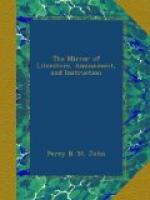Ah, joyless is our ’ingle nook,’—
Its genial warmth we own no
more;
Our fireside wears an alter’d look,—
A gloom it never knew before;
The converse sweet—the
cherish’d lore—
That once could cheer our stormiest day,—
Those revels of the soul are
o’er;
Those simple pleasures past away.
Then chide me not, I cannot sing
A song befitting love and
thee;—
My heart and harp have lost the string
On which hung all their melody;
Yet soothing sweet it is to
me,
Since fled the smiles of happier years;
To know that still our hearts
are free,
Betie what may, to mingle tears!”
Literary Souvenir for 1830.
* * * * *
NOTES OF A READER.
CURIOSITIES OF FRANCE.
Noted by John Locke.
At Lyons, “they showed us, upon the top of the hill, a church, now dedicated to the Virgin, which was formerly a temple of Venus; near it dwelt Thomas a Becket, when banished from England.... About half a league from St. Vallier, we saw a house, a little out of the way, where they say Pilate lived in banishment. We met with the owner, who seemed to doubt the truth of the story; but told us there was mosaic work very ancient in one of the floors.” At Montpelier, “I walked, and found them gathering of olives—a black fruit, the bigness of an acorn, with which the trees were thickly hung. All the highways are filled with gamesters at mall, so that walkers are in some danger of knocks.... Parasols, a pretty sort of cover for women riding in the sun, made of straw, something like the fashion of tin covers for dishes.... Monsieur Renaie a gentleman of the town, in whose house Sir J. Rushworth lay, about four years ago, sacrificed a child to the devil—a child of a servant of his own, upon a design to get the devil to be his friend, and help him to get some money. Several murders committed here since I came, and more attempted; one by a brother on his sister, in the house where I lay.” [This species of crime is therefore not so new in France as recent cases have induced the philosophical to imagine.]
“At Toulouse saw the charteraux, very large and fine; saw the relics at St. Sernin, where they have the greatest store of them that I have met with; besides others, there are six apostles, and the head of the seventh; viz. two Jameses, Philip, Simon, Jude, Barnahas, and the head of Barthelmy. We were told of the wonders these and other relics had done being carried in procession, but more especially the head of St. Edward, one of our Kings of England, which, carried in procession, delivered the town from a plague some years since....
“At Paris, the bills of mortality usually amount to 19 or 20,000; and they count in the town about 500,000 souls, 50,000 more than in London, where the bills are less. Quaere, whether the Quakers, Anabaptists, and Jews, that die in London, are reckoned in the bills of mortality.”— Lord King’s Life.




